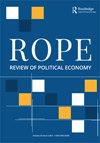后凯恩斯主义经济学:马克·拉沃的新基础第1章:非正统和后凯恩斯主义经济学的要点
IF 1.2
Q3 ECONOMICS
引用次数: 0
摘要
摘要Marc Lavoie的第一章很长(74页),非常刺激,有时甚至非常挑衅性,标题是“异端和后凯恩斯主义经济学的要点”。除了对理论和政策问题进行实质性讨论外,它还涉及经济学方法论和经济学不同学派的社会学(广义)中极其广泛的问题。空间的限制使我无法处理这些非常有趣、偶尔也会引起争议的命题。相反,我将把我的贡献局限于评估马克对异端和正统学派的立场(第1.2和1.3节,第4-16页);关于“原子主义与整体主义”的相关问题(第1.3.3节,第17-24页);关于后凯恩斯主义的不同观点,特别是他对海曼·明斯基、皮耶罗·斯拉法和米夏·卡莱茨基的处理(第1.4.3节,第40-46页);以及我们应该对后凯恩斯主义采用“窄帐篷”还是“宽帐篷”的定义这一重要问题(第1.4.4节,第46-49页)。本文章由计算机程序翻译,如有差异,请以英文原文为准。
Post-Keynesian Economics: New Foundations by Marc LavoieChapter 1: Essentials of Heterodox and Post-Keynesian Economics
ABSTRACT Marc Lavoie’s very long (74-page), very stimulating and sometimes very provocative first chapter has the title ‘Essentials of heterodox and post-Keynesian economics’. It deals with an extremely broad range of issues in economic methodology and in the sociology (broadly defined) of different schools of thought in economics, in addition to providing a substantial discussion of theoretical and policy questions. Space constraints prevent me from dealing with many of these very interesting and occasionally contentious propositions. Instead I shall confine my contribution to an assessment of Marc’s position on the heterodox and orthodox schools of thought (sections 1.2 and 1.3, pp. 4–16); on the related question of ‘atomism versus holism’ (section 1.3.3, pp. 17–24); on the different post-Keynesian strands, with particular reference to his treatment of Hyman Minsky, Piero Sraffa and Michał Kalecki (section 1.4.3, pp. 40–46); and on the important question of whether we should adopt a ‘narrow tent’ or ‘broad tent’ definition of post-Keynesianism (section 1.4.4, pp. 46–49).
求助全文
通过发布文献求助,成功后即可免费获取论文全文。
去求助
来源期刊

REVIEW OF POLITICAL ECONOMY
ECONOMICS-
CiteScore
2.60
自引率
20.00%
发文量
0
期刊介绍:
The Review of Political Economy is a peer-reviewed journal welcoming constructive and critical contributions in all areas of political economy, including the Austrian, Behavioral Economics, Feminist Economics, Institutionalist, Marxian, Post Keynesian, and Sraffian traditions. The Review publishes both theoretical and empirical research, and is also open to submissions in methodology, economic history and the history of economic thought that cast light on issues of contemporary relevance in political economy. Comments on articles published in the Review are encouraged.
 求助内容:
求助内容: 应助结果提醒方式:
应助结果提醒方式:


